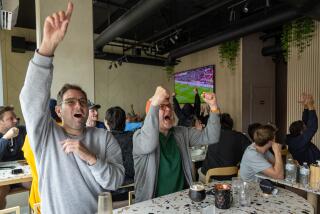Liverpool wants Yanks to go
- Share via
LONDON -- A mere 15 months ago, NHL owners George Gillett (Montreal Canadiens) and Tom Hicks (Dallas Stars, plus Texas Rangers) bought the Liverpool soccer club for a widely reported $435 million and won hosannas for their greet-the-people friendliness. They shook fans’ hands at Liverpool’s Anfield stadium and proclaimed its stunning din “like nothing I’ve ever heard or felt,” in Gillett’s words.
Since then the new owners have left skid marks in four directions. Georgey got peeved at Tommy. Georgey said he wanted to sell his half to those people from Dubai, but Tommy said Georgey couldn’t sell without Tommy. Tommy said he’d buy from Georgey, but Georgey said he wouldn’t sell to Tommy.
This could seem just another laugh-it-off case of high school never ending but for the setting and the heartsickness and the stratospheric finances. The 15-month saga of two American owners has beset venerable Liverpool soccer, the most successful club in English history and one of the foremost clubs on the planet, and it has aggrieved a fan base that may know no earthly peer in feeling a team in its very bloodstream.
“People are actually cracking up about this,” said Liverpool playwright Nicky Alt, soon adding, “They just don’t know who’s who and what’s going on.”
With Liverpool’s exiting the European Champions League semifinals Wednesday night at Chelsea in London, a dying season’s focus for many now turns to a new and wider grievance: shooing the Americans.
So it’s almost whiplash-worthy that fans have mounted a new supporters’ union in crisis, circulated petitions imploring Hicks to sell, heckled Hicks’ son at a pub in January, allegedly phoned in death threats on Gillett and made statements such as, “There’s no coming back for them now,” as stated Nick Atkinson from the newfound supporters’ union.
One fan, senior lecturer Dr. Rogan Taylor of the University of Liverpool’s school of management, heads a bid to buy the club in a mass-fan formation similar to Barcelona (soccer) and Green Bay (NFL). Another fan, Alt, plans to fly to Dallas, hoping to stand outside Hicks’ office with questions and some TV coverage.
How did things get from there to here?
At heart is the English -- and especially Liverpudlian -- resistance to the notion of sports clubs as “franchises,” rather than integral, organic parts of communities.
Then come four prominent words concerning Hicks and Gillett that hit unexpectedly in January: $700-million refinancing plan.
That revelation trumped all previous misgivings and sent the tide heading toward spite, Alt said, what with Hicks and Gillett having touted their relative debt-freedom just one year prior. Debt often makes English soccer fans conjure Leeds, which clambered near the top of Europe earlier this century only to free-fall with an anvil of debt from the English first tier all the way to the third. Debt also plunged Manchester United fans into a tizzy when it factored into the Tampa Bay Buccaneer Glazer family’s purchase of their club in 2005.
And then, Gillett and Hicks irritated beloved manager Rafael Benitez in November concerning the signing of players. And then, Gillett and Hicks met with German great Jurgen Klinsmann in January about possibly replacing the 2005 European champion Benitez. And then, they said they’d start a new stadium within 60 days but haven’t done so within 450.
And then, the gory intrigue of the owners’ seating area, which for an April home match with Chelsea included representatives of the Dubai International Capital, who have hoped to buy the club, gaining savior status in some quarters.
“Why people turned against the Americans is that all of a sudden, all this stuff is getting aired out in public,” Alt said. “ . . . It’s like the whole tradition has sort of been wiped out in a year, what we stood for.”
To understand “the Liverpool way,” it helps to understand Bill Shankly, the iconic Liverpool manager from 1959 to 1974. Shankly’s belief in football as communal treasure moved him such that he typewrote personal responses to fan letters. He returned fans’ calls. He bought tickets for needy fans. He believed a “holy trinity” of the game that included fans and players and managers but not owners, whom he saw as custodians. Then, Alt said, factor in Liverpool itself, a port town long ago flush with immigration and internationalism, but whose severe economic distress of the 1980s helped churn a general distrust for politics and business and media and the United Kingdom government.
Pile on top of that the world’s general distrust of most things American at the moment, and you get stadium banners such as, “U messed up Vietnam/U messed up Iraq/Don’t mess up Scousers (Liverpudlians)/By giving Rafa the sack.”
It’s just the tawdriness that chafes, the “dragging the club’s name through the mud,” Atkinson said. Said Alt, “The Liverpool way has gone.” And in its place, a howling that includes even health-advice columnist Dr. Miriam Stoppard in the Daily Mirror writing, “Hicks and Gillett have mistaken one of the country’s top four clubs for a business venture.”






